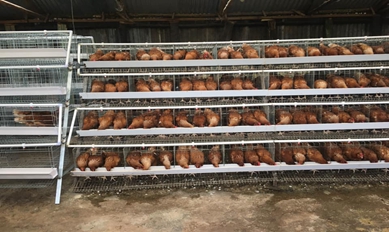egg tray machines
Nov . 19, 2024 17:11 Back to list
egg tray machines
The Rise of Egg Tray Machines Revolutionizing Packaging and Sustainability
In recent years, the demand for eco-friendly packaging solutions has skyrocketed. Among various innovations, egg tray machines have gained immense popularity for their ability to produce sustainable packaging products. These machines are not only efficient but also contribute significantly to environmental conservation by utilizing waste materials.
Egg tray machines are designed to convert waste paper, such as newspapers, cardboard, and other recycled materials, into sturdy and biodegradable egg trays. This process begins with pulping the paper waste, which is mixed with water to create a slurry. The slurry is then fed into the egg tray machine, where it is molded into the desired shape, typically in the form of an egg carton or tray. After shaping, the trays are dried, either naturally under the sun or using industrial dryers, depending on production requirements.
One of the primary advantages of using egg tray machines is their cost-effectiveness. Businesses can save significant amounts of money by recycling paper waste into profitable products rather than purchasing plastic packaging. Furthermore, the machinery itself is becoming increasingly affordable, allowing even small-scale entrepreneurs to enter the market. This shift not only enhances profitability but also promotes local economies by creating job opportunities around recycling and production.
From an environmental perspective, egg tray machines offer a dual benefit they reduce waste and minimize the reliance on plastic. Traditional plastic packaging contributes significantly to ecological issues, notably pollution and landfill overflow. In contrast, paper-based egg trays are completely biodegradable, breaking down naturally in the environment without leaving harmful residues. This characteristic aligns with the global movement towards sustainable practices and responsible consumption, making egg trays a preferred choice for many businesses and consumers.
egg tray machines

Moreover, egg tray machines can produce various other products beyond simple egg cartons. They can be adapted to create fruit trays, seedling trays, and even industrial packaging for fragile items. This versatility enhances their appeal and allows manufacturers to diversify their product offerings, catering to various market needs.
The operation of egg tray machines can vary, depending on the scale of production and the specific technologies used. Manual machines are available for small businesses or DIY enthusiasts, while automatic machines are designed for large-scale production, significantly increasing output and reducing labor costs. The automation of these machines has also led to higher efficiency and improved quality control in the production process.
In addition to the initial setup and production process, the egg tray manufacturing business is relatively straightforward and requires minimal ongoing maintenance. Existing manufacturers often report high operational efficiency and profitability, making this venture an attractive option for new entrepreneurs looking to tap into the growing eco-friendly market.
As consumers become increasingly aware of their environmental footprint, the market for sustainable products continues to expand. Companies that adopt egg tray machines and produce environmentally friendly packaging are likely to see increased demand for their products. This trend indicates a promising future for the egg tray manufacturing industry as it plays a pivotal role in the shift from plastic to more sustainable alternatives.
In conclusion, egg tray machines represent a significant step towards more sustainable packaging solutions. By transforming waste materials into valuable products, these machines not only contribute to environmental conservation but also offer entrepreneurs a viable business opportunity. As the world pushes towards a greener future, the role of egg tray machines will undoubtedly become more pronounced, helping to pave the way for a more sustainable and responsible approach to packaging.
-
Hot Sale 24 & 18 Door Rabbit Cages - Premium Breeding Solutions
NewsJul.25,2025
-
Automatic Feeding Line System Pan Feeder Nipple Drinker - Anping County Yize Metal Products Co., Ltd.
NewsJul.21,2025
-
Automatic Feeding Line System Pan Feeder Nipple Drinker - Anping County Yize Metal Products Co., Ltd.
NewsJul.21,2025
-
Automatic Feeding Line System - Anping Yize | Precision & Nipple
NewsJul.21,2025
-
Automatic Feeding Line System - Anping Yize | Precision & Nipple
NewsJul.21,2025
-
Automatic Feeding Line System-Anping County Yize Metal Products Co., Ltd.|Efficient Feed Distribution&Customized Animal Farming Solutions
NewsJul.21,2025






